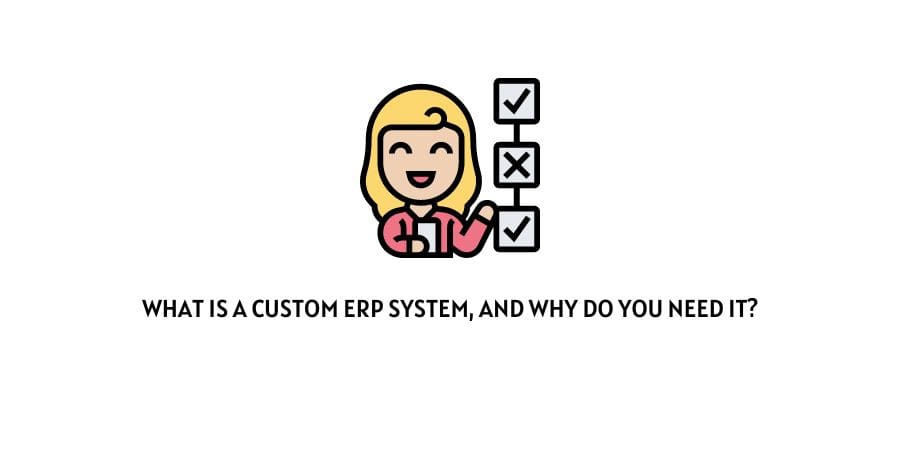
Managing internal processes can be difficult, but an ERP system will make it much more manageable. Please read our article and learn how to build your own ERP system from scratch.
Operating your own company can be a gift and a condemnation. On the one hand, this is an endless scope for personal and financial growth.
On the other hand, this is a 24/7/365 accountability that can turn into hell. And you want your business to perform well.
That’s why it’s critical to manage all the resources you have effectively. Everything must run like clockwork, from the purchasing to the sales and marketing departments. The ERP (Enterprise Resource Planning) system can help with this.
This post will discuss what ERP is, its benefits to your business, and how to create an ERP application. We’ll discuss some great ERP resolutions and why you should consider employing an ERP developer. Let’s start.
What is ERP software?
It has been around for many years. This is the fruit of the evolution of material resource planning, which helped to manage factories effectively.
However, the world soon embraced digitalization in almost every aspect of business and commerce.
Consequently, it was important for enterprises to efficiently manage resources, collect and store large databases, make forecasts and business decisions based on them, and quickly adapt to varying circumstances.
ERP systems allow businesses to operate their day-to-day functions by creating a strategic vision for the future of their businesses.
This is achieved by developing an integrated ecosystem that can affect each unit. ERP collects data from them and puts them to work to improve the efficiency of the business and keep on expenses.
In other words, an ERP system operates data from extra departments, studies it, and allows to optimization of daily business actions.
Its main advantage lies in the transparency and consistency of several business processes.
An ERP system may also have company implementation managing software that allows project, funding, prediction, and reporting on an organization’s economic execution.
ERP is like Lego which suggests you may create whatever you want and need for your business needs.
Does your company have a purchasing department? Include it in your ERP system. It will help your purchasing team place and quote orders much more accessible, make contract management, supply chain management, and supplier auditing transparent, etc.
Is it growing so fast that HR departments feel overwhelmed by the number of new hires and have difficulty hiring and adapting them? ERP can simplify this process.
An ERP system for your company will be tailored to meet your needs.
You can also learn what differentiates CRM and ERP systems. Both are widespread kinds of business software, and each is designed to increase the profitability of an organization.
However, while there is some mutual compatibility – ERP may even contain some sort of “lightweight CRM” – there are differences in their respective features.
Typically, a CRM system is focused on connections and dealings with current and possible clients, but an ERP system concentrates on and enhances every element of your industry.
Thus, while CRM helps increase deals and enhance connections with existing clients, ERP aids decrease expenses, optimizing business operations, and collecting and analyzing data to facilitate decision-making.
CRM also benefits small and medium businesses, while ERP can benefit large and complex organizations with multiple departments involved. How to choose the only one, and how to build your own ERP system from scratch? Well, you don’t need that, as many organizations have a combination: an integrated CRM and ERP system.
ERP statistics and facts
You may be wondering how ERP systems impact companies. Here are some of the data accumulated by Selecthub and Softwarepath in 2021 and 2022:
- According to Selecthub, 88% of organizations consider implementing ERP a great solution that has helped their business succeed.
- Softwarepath reports that 20% of organizations have adopted ERP to support growth. Another 20% did it to expand functionality, and 10% sought to combine disparate features.
- According to Softwarepath’s 2022 survey report, increased sufficiency (35%) and cost-benefit (29%) are among the top reasons to adopt ERP solutions.
- Employees in the finance and accounting department (23%) are the most influential in purchasing an ERP (source: Oracle Netsuite 2022).
- ERP reduces operating costs by 23% and administrative expenses by 22% (according to Softwarepath 2022).
- Companies spend an average of 17 weeks choosing ERP software (Softwarepath 2022).
- According to statistics, 62.7% of companies choose cloud-based ERP software (i.e., Panorama Consulting Group, 2021).
What are the advantages of an ERP business solution?
Today’s companies value ERP software because it assigns them to create data-driven findings. Nevertheless, the proper ERP system can accomplish much more. Here is a list of the benefits that your company can benefit from a customized ERP implementation:
1. Expanding integration, interaction, and cooperation
Since all departments are involved, and the state of affairs becomes visible, it is much easier to cooperate.
Tasks are often performed a certain way only because everyone is used to it rather than because it is the reasonably probable choice.
ERP systems make business operations visual and translucent, allowing managers to find the best approach to accomplish tasks and reduce unnecessary steps.
2. Business information is always available
Also, it is accessible from any device as long as cloud ERP software is deployed. This benefit is inextricably linked to the enhanced integration, interoperability, and partnership that ERP methods present to businesses.
Real-time reporting allows you to see the company’s state and compare the performance of different departments to understand which one needs more attention or organization.
3. No more manual reporting
Data from all modules is gathered and transformed into graphs and diagrams that accurately represent business rates and performance.
So you can say goodbye to spreadsheets. What’s more, crystal-clear reports allow for better planning.
4. Automated business processes
Routine and repetitive activities such as payroll and invoicing may be automated to decrease mistakes and stop redundant person-hours so employees can focus on more creative tasks.
5. Reduced operating costs
ERP software makes the so-called bottlenecks visible so the team can react quickly and adjust their strategy.
Moreover, administrative costs can also be reduced since the quantity of paperwork is greatly decreased, and numerous routine duties are automatic.
6. Data security
It has evolved the unique gold for businesses across industries, and keeping it safe, and sound is one of the top priorities for a company.
Not only because data breaches can harm a company’s standing but even because data supplies useful information and facilitates decision-making.
ERP systems help protect this priceless asset. How? Typically, ERP systems store data in one place rather than distributing it across numerous systems and appliances and allocating various access levels to involved employees.
Which industries can benefit from integrating ERP modules?
Building an ERP system can benefit a variety of industries. The list includes:
- production;
- construction;
- electronics and technology;
- automotive;
- aerospace and defense;
- healthcare;
- agriculture;
- food and drink;
- fashion;
- tourism and hospitality;
- retail.
One necessary clarification should be made here. The list is not limited to these industries, as ERP software development is tailored to specific business needs and can be tailored to meet specific business challenges.
How to build your own ERP system from scratch? Kinds of ERP systems
We understand that ERP solutions can be tailored to satisfy distinctive requirements. So, to discover the best match, you can select between various types. There are 3 groups based on deployment options:
1. Cloud ERP systems
This enterprise resource planning software allows a company to access data from any device connected to the internet.
2. Local ERP systems
They are installed in a physical space and are only accessible from the company’s computers and servers.
3. Hybrid or flexible ERP systems
They are a mix of both kinds. This group of ERP software lets companies relocate between delivery standards and integrate certain benefits.
Small Business Tip: Small and Medium Enterprises (SMEs) do not operate on the same scale as large or multinational companies.
However, they have challenges to overcome. Compared to typical ERP solutions, small business software offers fewer features and modules. This makes it more accessible.
How to build your own ERP system from scratch?
It’s safe to assume you’ve decided to get custom-designed ERP software. However, if you are reading this guide, this may be your first introduction to the world of resource planning.
Since we promised to cover all aspects of ERP development, we will start with the ERP development lifecycle, so you maintain an opinion of what it looks like.
These are the seven must-have steps to help you develop your ERP software.
1. Define your goals and expectations
Decision-makers must answer questions that will ultimately affect the development of ERP software.
It all begins with questioning yourself the correct questions:
- Which of your processes needs to be improved?
- Why do we need an ERP system in our company?
- Who will be the ERP users?
Of course, these are just three main questions. The more complex the ERP system you need, the more questions you will need to answer. They will be the starting point for developing your ERP system.
2. Convey them to the ERP development team
Your purposes and anticipations will assist the development team in thoroughly comprehending your organization’s state of affairs, determining which programming language will work best, and proposing the design of your future ERP system.
When you must develop an ERP system and combine ERP modules, the more data you have, the more useful.
3. Start Wireframing
You now have familiar ground with the development team and decide on what type of ERP software you require. So, it’s time to begin wireframing, which starts with a few basic findings:
- the actual number of modules;
- resources needed, i.e., team size and estimated number of person-hours;
- timing.
At this point, you will have a pretty clear estimate of the hours and technical stack required.
4. Design
The name speaks for itself. This is the core step of the entire ERP creation process, as it will lead to the last understanding of your answer.
Designers will supply you with an excellent user interface and smooth visuals, while software engineers will write the code.
Then, if everything is in order and approved by you, ERP will move on to the next stage.
Beautifully designed menus and buttons are only the pinpoints of the iceberg named UX/UI design.
You know the design group has done a fantastic job of assembling it straightforward and intuitive for the people who need to use the ERP system in your company to interact with it.
That’s what UX/UI designers need information for — to create excellent and easy-to-use interfaces.
5. Develop
Once the technology stack and features are defined, the development team is ready and knows how to build your own ERP system from scratch.
6. Test, test, test
This phase includes a process in which you will improve and tweak, redesign and redesign, but it’s all part of creating high-performing software.
Excellent ERP software results from the collaboration between you and the development team, so testing is essential.
7. Expand
When feedback is collected, bugs are fixed, and changes are made, your business benefits from implementing an ERP system.
Like This Post? Checkout More
